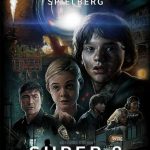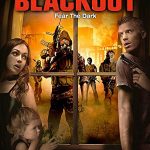Jumanji (1995)
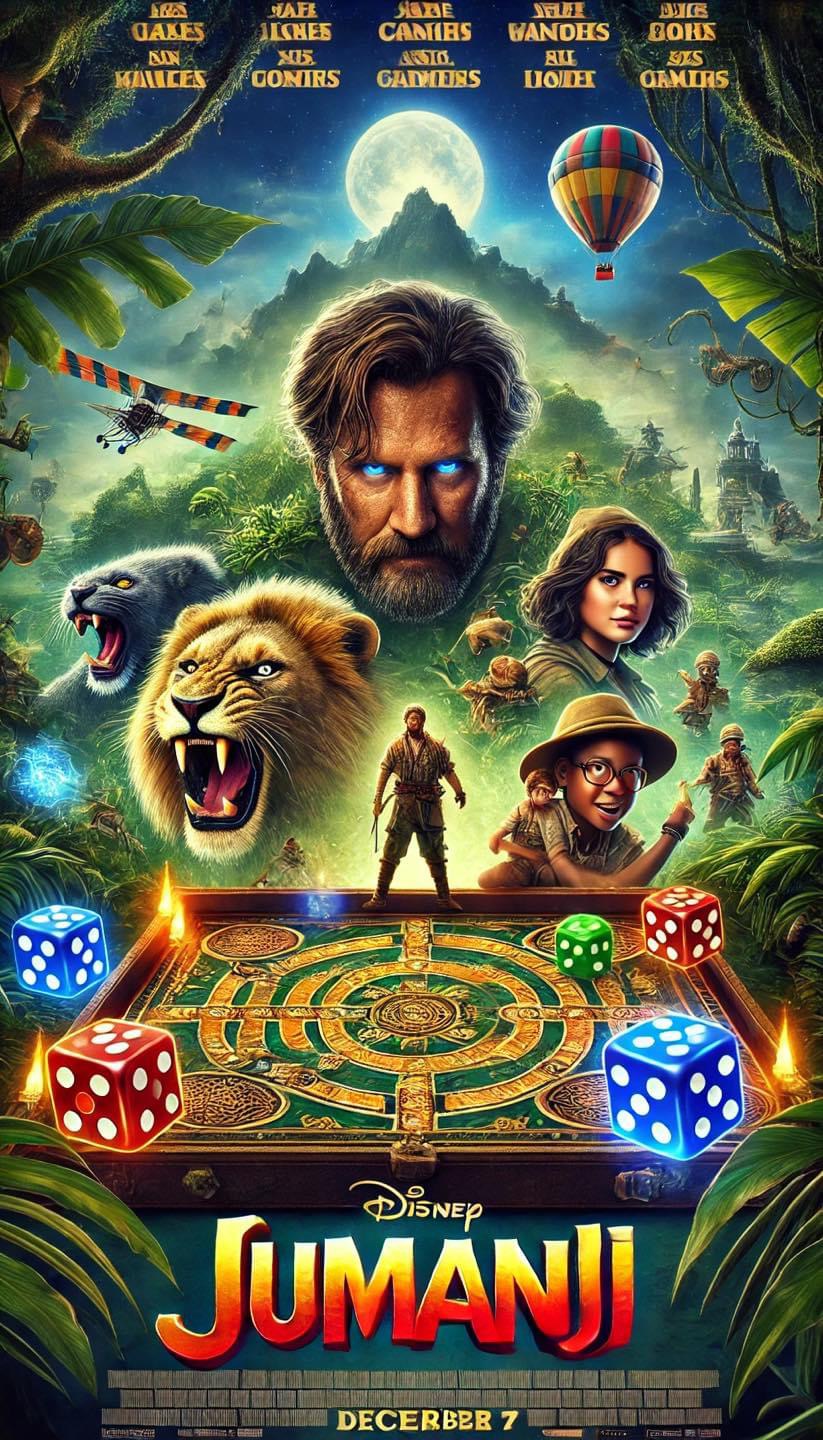
Jumanji (1995), directed by Joe Johnston, is an adventurous fantasy film that has become a nostalgic classic over the years. Based on the 1981 children’s book by Chris Van Allsburg, the film blends lighthearted adventure with darker, more ominous themes, making it stand out in the family film genre. While today’s audiences might be more familiar with the recent Jumanji reboots, the 1995 original remains beloved for its unique premise, Robin Williams’ performance, and its groundbreaking (for the time) special effects.
Suggested videos for you:
Plot and Themes
The story of Jumanji revolves around a mysterious board game that has magical, dangerous consequences for those who play it. In 1969, a young boy named Alan Parrish (played by Adam Hann-Byrd) discovers the game in a construction site. After he and his friend Sarah Whittle (Laura Bell Bundy) start playing, Alan is sucked into the game’s jungle world, where he remains trapped for 26 years. Fast forward to 1995, when siblings Judy (Kirsten Dunst) and Peter Shepherd (Bradley Pierce) move into the Parrish family’s abandoned mansion and discover the Jumanji board game. When they begin playing, they inadvertently release Alan (now an adult, played by Robin Williams), who has been surviving in the perilous jungle for decades.
What follows is a chaotic and thrilling adventure where the characters must complete the game to stop the dangerous creatures and natural disasters that the game unleashes on the real world. Each roll of the dice brings a new, unpredictable threat, from stampedes of wild animals to monsoons and man-eating plants. The movie’s plot structure is simple but effective: it’s a race against time to finish the game before the entire town is destroyed by the increasingly dangerous consequences of their rolls.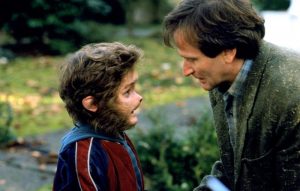
Robin Williams’ Performance
Robin Williams delivers a remarkable performance as the grown-up Alan Parrish. Known for his versatility, Williams brings both humor and depth to the role. He captures the trauma and emotional weight of a man who has been stranded in the jungle for most of his life, while also injecting his signature comedic timing into the character’s interactions with the modern world. Alan is a man out of time, unfamiliar with the advancements of 1990s society, and Williams plays this with a mixture of bewilderment and frustration. His chemistry with the younger cast members, especially Kirsten Dunst and Bradley Pierce, is believable and heartwarming, adding an emotional core to the action-packed narrative.
Adventure and Visual Effects
One of the defining aspects of Jumanji is its action and adventure. From the moment the board game is opened, the film plunges its characters and the audience into a relentless series of escalating dangers. The jungle animals, including rhinos, monkeys, lions, and giant spiders, are brought to life using a mix of practical effects and CGI. Though some of the CGI appears dated by modern standards, at the time, Jumanji was considered groundbreaking in its use of special effects to create immersive, fantastical sequences. The film’s visual effects were particularly ambitious for a mid-90s production, with Industrial Light & Magic (ILM) handling the CGI elements. While certain scenes, especially involving the animals, may appear somewhat cartoonish today, they were highly impressive during the film’s release and helped elevate the sense of danger throughout the movie.
The set pieces, including a stampede through a small New England town and a climactic scene in a rapidly flooding mansion, are filled with tension and creativity. The unpredictability of the game means the characters (and by extension, the audience) never know what disaster will befall them next. This sense of escalating chaos keeps the energy high and the pacing brisk, making for a thrilling experience from start to finish.
Dark Undertones
Despite its reputation as a family-friendly adventure film, Jumanji carries some surprisingly dark and serious undertones. The game itself is more than just a whimsical piece of magic—it is a force of destruction that rips apart lives and brings genuine peril. Alan’s 26-year entrapment in the jungle is depicted as traumatic and life-altering, turning him into a man who has lived in constant survival mode. The terror on the characters’ faces as they encounter the increasingly dangerous results of their dice rolls is palpable, and the film does not shy away from showing that the stakes are life and death.
There are also themes of loss and abandonment. Alan’s disappearance leads to his parents’ ruin, and the house becomes a metaphor for his family’s decline—once grand and lively, now dusty and derelict. Judy and Peter themselves are dealing with the loss of their parents, who died in a car accident prior to the events of the film. These layers of emotional depth give Jumanji a darker, more complex tone than one might expect from a family adventure, making it resonate with older viewers as well as children.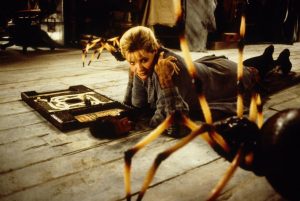
Supporting Cast
Kirsten Dunst and Bradley Pierce are effective as the young siblings who unwittingly trigger the game’s chaos. Dunst, who was still in the early stages of her career, shows a level of maturity and emotional range that helps anchor the film. Her character, Judy, is both resourceful and vulnerable, dealing with the loss of her parents while trying to protect her brother.
Bonnie Hunt, as the adult Sarah Whittle, brings a great deal of humor and heart to the film. Having been traumatized by her childhood experience with the game, Sarah is initially reluctant to re-enter the world of Jumanji. Hunt’s performance balances Sarah’s fear with her sense of responsibility, and she provides a nice counterbalance to Robin Williams’ more frenetic energy.
Jonathan Hyde plays a dual role as both Alan’s stern father and the film’s primary antagonist, Van Pelt, a deranged hunter who is released from the game and becomes obsessed with killing Alan. Van Pelt is a terrifying figure, representing the dangers of the jungle and Alan’s deepest fears, while Hyde’s portrayal adds a layer of symbolic weight to the character.
Music and Atmosphere
The musical score, composed by James Horner, complements the film’s adventurous and ominous tone. Horner, known for his work on films like Titanic and Braveheart, infuses the score with both grandeur and mystery. The music elevates the film’s fantastical elements, particularly in scenes where the jungle overtakes the real world. It adds to the sense of dread when the characters realize that each roll of the dice unleashes something worse than the last.
The overall atmosphere of the film is one of unease and excitement. The setting of the Parrish mansion, with its cobwebs and abandoned rooms, serves as an eerie backdrop to the events of the game. The contrast between the sleepy New England town and the wild, untamed forces of nature that invade it helps to create a sense of magical realism, where the boundaries between the ordinary and the extraordinary are blurred.
Legacy
Jumanji was a box office success, grossing over $260 million worldwide, and it has remained a beloved film for many who grew up in the 1990s. Its blend of humor, adventure, and suspense resonated with audiences of all ages, and its unique premise has given it lasting appeal. While the visual effects may not have aged perfectly, the film’s charm and heart still shine through.
The film’s legacy has only grown with the release of the more recent Jumanji sequels, which reimagine the concept for a modern audience. However, the original film maintains a distinct identity with its darker tone, its reliance on practical effects, and its focus on character-driven storytelling. Robin Williams’ performance, in particular, is a major reason why the film continues to be cherished. His portrayal of Alan Parrish brings both humor and pathos to the role, making Jumanji more than just an action-packed adventure—it’s a story about confronting your past, facing your fears, and finding your place in a world that feels out of control.
Conclusion
Jumanji (1995) is a thrilling, imaginative film that offers a balance of excitement, humor, and emotional depth. Its unique concept, strong performances, and adventurous spirit have ensured its place in the pantheon of 1990s classics. While some of the special effects may feel dated today, the film’s heart and sense of wonder continue to captivate audiences, making it a timeless entry in the fantasy adventure genre.









